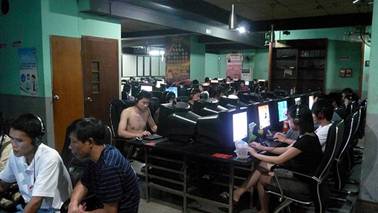Game manufacturing and game development in China is beginning to become a huge business. With the amount of people in China combined with their seemingly natural attraction towards games, the influence that China might have on the future of gaming could be massive. However, there’s one large thing holding this massive chain of events back, the Chinese government.
It seems to some that when gaming is mentioned, the last entity you want to hear from is one adorning the red flag. In 2004, The Ministry of Culture set up a committee that screened against imported games which potentially had the wrong message for their audience. Some of the regulations include
· Violating basic principles of the Constitution
· Threatening national unity, sovereignty and territorial integrity
· Divulging state secrets
· Threatening state security
· Damaging the nation's glory
· Disturbing social order
· Infringing on others' legitimate rights

Sims 2, Photo: SpoilMeWith
Most games guilty, such as Hearts of Iron and Football manager, were banned for either giving Tibet, Hong Kong, Taiwan or Macau their own independent country while others were banned for ‘smearing the image of China’ or ‘blackening the image of the Chinese army’. Indeed, in 2005, nearly 50 electronic games were banned, including The Sims 2 and FIFA 2005.
Although censorship hasn’t been a deal breaker for most western game developers, Activision Blizzard, who runs World of Warcraft are looking to be largely disappointed if their new expansion isn’t allowed to see release. And soon.
On March 13, 2009, it was reported that The9, the company who supplies Chinese WoW gamers with their fix faces bankruptcy if the censorship board doesn’t allow them to release the game and gain back some profit from the game’s licensing fee and upkeep of vital equipment.
This isn’t the first time that The9 has had to change in-game content to please the censorship board. Just look at the release of the original game and the first expansion: The Burning Crusade. In the first two releases, gamers found that skeletons, a pervasive imagery of the game themselves, were banned. Instead, the developers put flesh on the skeletons or danced around the issue by putting graves in. These changes were all to promote a ‘healthy and harmonious on-line environment.’

Photo: gruntzooki
The9 has submitted 2 versions to the censor board which were subsequently denied and is eagerly awaiting the next ‘fixed’ version which they hope can be released sometime in April. The changes in this version include taking out a city raid mission, and removing an entire class: The Death Knight. The surprising thing is that the Death Knight was and is one of the most exciting things about the expansion. Without this class, Chinese gamers will be missing a huge part of the game.
“Right now, we're adventuring in a very grim Azeroth. The very things that are frowned upon in Chinese games (exposed bones, etc) are a primary focus of Wrath of the Lich King. That's not good for WoW's future in China. Not good at all.” – The Wow Insider
With so many games without a home in our China, what is a fledgling development base supposed to do? The answer: Fill it with propaganda games, for a brighter harmonious China.
The trend of promoting healthy lifestyles was started with Learn from Lei Feng, in 2004. The game, named after Lei Feng, a Chinese soldier who became a symbol of altruism in government propaganda after his accidental death in 1962, allows the users to do good deeds and collect points as they continue throughout the game.

Photo: Herr_Bert
The trend was then continued in 2005 with the announcement of a game featuring historic figures ‘based on old-fashioned Communist values’ called Chinese Hero Registry. In this game you will play as a model Communist soldier who is famous for his kind streak. To advance in the game you need to…wait for it…mend socks, help elderly to their homes during a rain storm and stop people from spitting. The reward is a digitally signed copy of Mao’s Little Red Book.
Continuing with fascinating trends, in August 2007, Kotaku reported that development in the Zhejiang province on an anti-corruption game titled Incorruptible Fighter, was going to be developed by the Zhejiang government.
"Players fight their way through one level after another, overcoming all obstacles to eliminate corrupt officials and enter a spring-like paradise filled with birdsong and the scent of flowers, a peaceful world where people live in love, harmony and national prosperity," the Ningbo city government said in a statement.
The government acts and the people react. This cycle isn’t likely to change soon, but the government is slowly figuring out how to reach their intended audience through a medium that most governments have largely ignored. Despite criticisms of overly harsh censorship from its people, The Party seems to ‘get it’ in a way that is both a bit refreshing and scary at the same time.
***
Expat Corner > The Viper That Bit Me – Gaming in China
Biz China > Sohu's Ambitious Stepchild
China Explorer > Internet, Cameras, and Egg Rolls – Travel Q&A
Warning:The use of any news and articles published on eChinacities.com without written permission from eChinacities.com constitutes copyright infringement, and legal action can be taken.
All comments are subject to moderation by eChinacities.com staff. Because we wish to encourage healthy and productive dialogue we ask that all comments remain polite, free of profanity or name calling, and relevant to the original post and subsequent discussion. Comments will not be deleted because of the viewpoints they express, only if the mode of expression itself is inappropriate.
Please login to add a comment. Click here to login immediately.